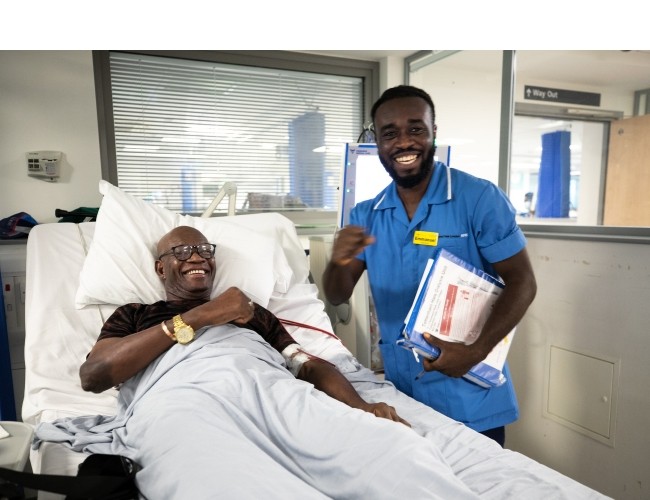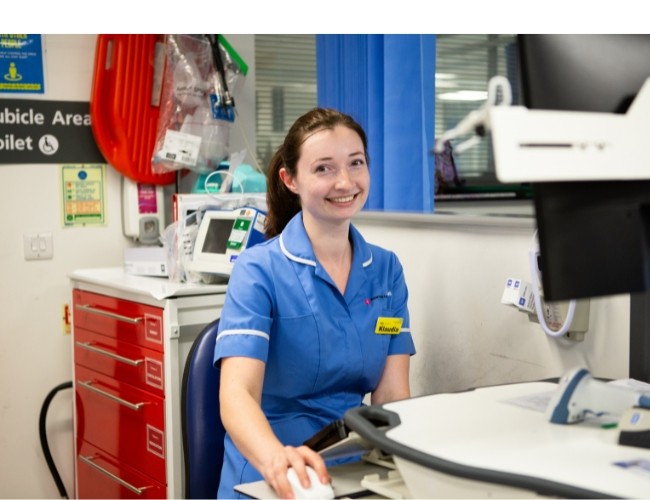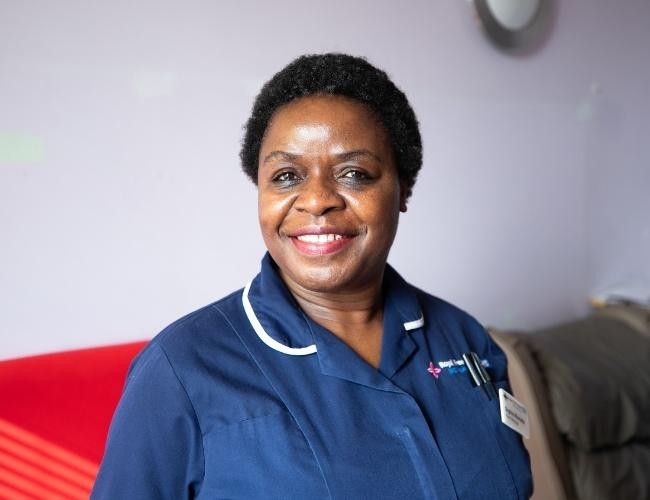A successful kidney transplant offers patients with kidney failure the chance to lead a nearly normal life without the need for dialysis.
Most patients feel stronger and have more energy after a transplant. In addition, many do not need to restrict their fluid intake or the type of food they eat.
A good working transplant can help patients with kidney failure live longer when compared to staying on dialysis.
Not all patients will benefit from having a kidney transplant and only half of all patients with kidney failure are suitable to have a transplant.
Each kidney patient is assessed individually to see if transplantation is the best option for them and if they are fit enough to have a transplant.
If you are not sure, ask your kidney doctor or specialist nurse to explain this further.
You can also call our pre-transplant assessment nurse on 020 7794 0500 ext 34084 to discuss transplantation — they may make an appointment for you in the pre-transplant assessment clinic.
Kidney transplantation requires a major operation and patients have to be fit enough to have a general anaesthetic (which puts you to sleep for the operation).
Patients who have significant heart, circulation or breathing problems may not be fit enough to have a transplant.
Patients who have had cancer or serious infections may not be able to have a transplant due to the risk from weakening their immune system after the transplant and/or reoccurrence of their disease.
Advancing age does not rule patients out from having a transplant, but frail patients may not be able to tolerate the operation or medications needed after the transplant.
You cannot have a transplant when you are pregnant.
The doctor will ask you a lot of questions about your health and examine you.
You will have blood tests to check for infections, blood count and type, genetic type and a number of other important tests.
You will be asked to have a tracing of your heart (ECG) and a chest X-ray.
The doctor may also ask you to book further tests of your heart, blood vessels or other scans (such as an echocardiogram, CT scan, ultrasound or MRI).
The doctor will give you some information about transplantation and what is involved, and you will also receive a patient information booklet, but you should also ask any questions you may have.
It may be an idea to write down any questions you want to ask and bring them with you. You may find it useful to bring along a relative or friend for support and to discuss any issues raised at your consultation.
You should also attend one of our transplant information evenings to make sure you and your relatives are fully prepared for a transplant.
If you have any further questions, you can ring the pre-transplant assessment nurse on 020 7794 0500 ext 34084.
Following your assessment, if the doctors feel you are suitable to have a kidney transplant, your name will be submitted to NHS Blood and Transplant for placement on the national waiting list for a deceased-donor transplant.
If someone is going to give you a kidney (live-donor transplant), you may want to wait for their kidney without going on to the national waiting list.
The best way to receive a kidney transplant is if someone is prepared to give you one of their kidneys.
If someone wants to give you a kidney, you should call the live donor nurses on 020 7317 7604 to see if they would be a suitable donor for you.
No. It is usually better if we can arrange a transplant before you need dialysis. This is called a pre-emptive transplant.
If your kidney function is slowly getting worse, please ask your kidney doctor or specialist nurse about pre-emptive transplantation.
Kidney transplantation requires a major operation and patients have to be fit enough to have a transplant.
There are risks involved with receiving a transplant and a number of complications can occur from the operation.
Not all kidney transplants work and some transplants can have complications with the blood vessels and draining tube of the kidney.
A lot of medication is required after the transplant and patients can suffer from side effects.
Medications (immunosuppression) weaken the immune system and patients are at increased risk of infection and some cancers.
Despite all the tablets, around 10-15% of kidneys can undergo rejection and may require stronger immunosuppression medication for treatment.
There are two different types of kidney transplant:
Deceased donor transplant: using a kidney from someone who has died and donated his or her organs.
Living donor transplant: using a kidney donated by a living person. This is usually a relative, partner or friend, but occasionally is someone unknown to the recipient.
All patients listed for a living donor transplant and those who are on the waiting list for a deceased donor transplant will be seen in the outpatient clinic by a nephrologist (kidney doctor) and surgeon.
We will ask you to sign a consent form and will send you a letter when you are on the waiting list.
NHS Blood and Transplant (NHSBT) organises the allocation of deceased-donor kidneys in the UK. It has to ask your permission to use your personal information for the waiting list.
The consent form lets NHSBT know that you are happy for it to use your personal information and put your name on the national waiting list. It does not use this personal information for anything else.
We may ask you to sign a consent form to let us know that you are happy to go on to the transplant waiting list and understand some of the risks involved with transplantation.
You should carry on as normal, but make sure you stay as healthy as you can.
Regular exercise will help maintain your fitness and if you smoke, you should stop.
You should be careful about your diet in order to avoid carrying too much weight. Significant increases in your weight may prevent you from having transplantation.
Your doctor or specialist nurse will review your fitness for transplant on a regular basis.
Let your doctor or specialist nurse know if you are ill or go away on holiday, as you may need to be temporarily suspended from the list. Let your doctor or specialist nurse know when you are better or return from holiday, so they can reactivate you on the list.
If you have dialysis abroad when on holiday, you may need a longer period off the list while we check you have not caught any infections from the holiday dialysis unit.
It is very important we have up-to-date contact information for you, particularly phone numbers. A transplant call can come at any time and if we cannot get hold of you, we will have to offer the kidney to someone else.
Please let the receptionist or dialysis staff know if you have changed phone number or moved home.
Make sure your phone is in working order and always switched on. You never know when you might get that call!
After you have made the decision to have a kidney transplant, there will be a period of waiting until a suitable donor kidney becomes available — unfortunately we cannot predict when this will be.
NHSBT allocates kidneys by blood group and tissue type. This system is in place to ensure the best match between you and the donor kidney.
The wait can be anything from a few weeks to many years but on average, patients who are blood group A or AB wait just over two years and patients who are blood group O or B wait just over three years.
If your tissue type is rare or you are sensitised to certain tissue types (from blood transfusions, previous transplants or pregnancy) you may wait longer than the average.
Kidneys are allocated by NHSBT according to blood group and tissue type.
Your doctors have no control over the list, and we cannot reduce your wait, but if someone is prepared to give you a kidney, this may reduce the time to transplantation.
If a friend or relative wants to give you a kidney, you should ring the live donor nurses on 020 7317 7604 to arrange matching with this person and see if they would be a suitable donor for you.
The offer of a kidney may come at any time, day or night.
Make sure you have your phone switched on and with you at all times. If we cannot get hold of you, we will have to offer the kidney to someone else.
Think about how you will get to the hospital when you are called, remembering that it may be in the middle of the night.
If you have pets or young children, think about who will be able to look after them at short notice.
A doctor from the transplant team will ask you to come to the hospital straight away.
Please let the doctor know if you are unwell or have been into hospital recently. We will require you to be in the best possible health for your transplant operation.
- Do not delay coming to the hospital, as this will increase the time we have to store the kidney and may impact on the transplant.
- Do not have anything else to eat or drink, as you will need to have an empty stomach for the anaesthetic.
- Do switch off all lights and appliances, as you might be in hospital for some time.
- Do let a neighbour or relative know you are going into hospital.
Go straight to 10 East ward (10th floor of the Royal Free Hospital) and let the ward nurses know you have come in for a kidney transplant.
A doctor from the transplant team will assess you to make sure you are fit enough to have a transplant.
The doctor will take your blood in order to confirm that you are a match with the kidney and see whether you need dialysis before the operation.
You may need a further chest X-ray and ECG (tracing of your heart). You will also have a rapid PCR test to make sure you do not have COVID-19.
An anaesthetist will come to see you to make sure you are fit for a general anaesthetic.
A surgeon will come to see you and explain some details about the donor kidney that has been offered to you, go through the risks and benefits about the operation, and provide information about your expected recovery after the operation.
The surgeon will ask you to sign a consent form for the operation, confirming you are happy to have the kidney transplant and understand all the facts about the operation.
You may be asked whether you want to enter a research trial. Enrolling for a trial is entirely optional and your transplant does not depend on you entering any trials.
Yes. The staff will be able to tell you the age, sex and some relevant medical details about the donor. This will help you decide if you want to have the kidney transplant.
Due to the privacy of the donor and their family, we will not be able to tell you any other details about the donor.
No. We have to make sure you are fit enough to receive the transplant, and nothing has changed since you were last assessed — for example, we need to check you have not had heart problems, put on too much weight or have an infection.
The kidney must be matched to your blood to make sure you do not react to the kidney. If your blood reacts to the kidney (a positive crossmatch), there would be a high risk of you rejecting the kidney and we would offer the kidney to someone else.
This test takes about four hours to complete and may be delayed while we are waiting for the kidney to arrive.
If the crossmatch is positive, we will let you go home as soon as we know the result.
The surgeon will need to carefully examine the kidney to ensure there is no problem to prevent the transplant going ahead.
No. It is your choice whether you receive the kidney, but kidney offers do not come around often and it may be a long time before you are offered another kidney.
The delay involved with assessing you increases the storage time for an organ and may mean it cannot be offered to another patient.
If you do not want to have a transplant, please ask your doctor to remove your name from the waiting list.
If you turn down a kidney transplant, we may ask you to come to the Royal Free Hospital for a further discussion about transplantation.
The government has issued guidance for people who are at very high risk of severe illness from COVID-19 because of an underlying health condition, and for their family, friends and carers.
As a transplant patient you fall into this category and are at greater risk from COVID-19.
You can read the most up to date government advice, and NHS Blood and Transplant and Kidney Care UK also provide a good summary of the current advice for patients.
Please also see the latest information about vaccination for transplant recipients.
The field of transplantation is constantly improving, and research studies and clinical trials are needed to establish the best treatments for patients.
You may be asked to take part in clinical research trials, but the decision to take part is entirely up to you and there is no obligation for you to take part in a trial.
Any trial will be discussed with you in full and you will be given a patient information sheet.
If you decide not to take part in any trial, your treatment will not be affected in any way.
These research studies could be of immense benefit to future transplant recipients.
Click the link below for more on how the Royal Free Hospital and University College London are undertaking research into kidney transplantation.
 Translate
Translate


